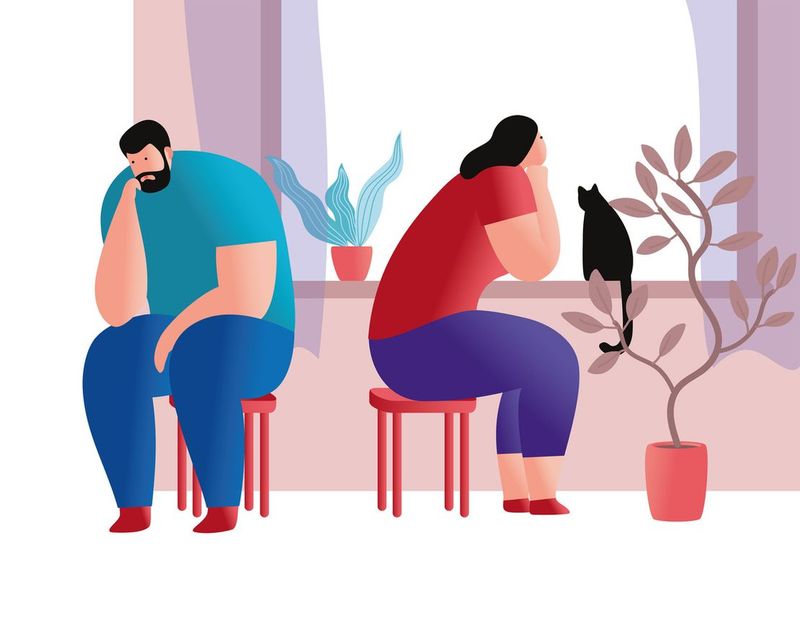15 Surprising Reasons Good People Cheat: The Dark Side of Long-Term Monotony
We like to think cheating is black and white—but in long-term relationships, it’s often murkier than we admit. Not every betrayal is born of malice; sometimes, it’s the slow erosion of connection, routine, or unmet emotional needs.
These 15 surprising reasons good people cheat explore the complicated, uncomfortable truths behind infidelity—not to excuse the behavior, but to understand it.
Because real insight starts when we stop asking, “How could they?” and start exploring the silent ways relationships lose their spark. If you’ve ever been on either side of betrayal, this might offer the clarity you didn’t know you needed.
1. Emotional Numbness Mistaken for Falling Out of Love

When the spark fades, some panic and seek it elsewhere instead of facing the discomfort at home. They might confuse the routine silence and lack of excitement with a loss of feelings. A small thrill outside the marriage can seem like a relief from the dullness they’re not ready to confront.
Their mistake is in linking emotional numbness to lost love. Instead, it could be a sign that their relationship needs some attention and care.
Finding connection doesn’t always mean finding someone new. Sometimes, it means reigniting what’s been there all along. It’s like catching a glimpse of color in a black-and-white photo.
2. The Temptation of Novelty

Even the most loyal people can get seduced by the thrill of being seen as new by someone else. There’s something alluring about the unfamiliar—an excitement that breaks the monotony of everyday life. That fresh perspective can feel intoxicating, making the everyday routine seem dull in comparison.
This craving for novelty doesn’t mean they love their partner any less. It’s more about the human desire for growth and exploration, an experience that seems exciting and rejuvenating.
But chasing novelty without addressing underlying relationship issues can lead to heartbreak. A momentary thrill may not be worth the long-term impact on a stable, loving relationship.
3. Feeling Invisible at Home

It’s not about intimacy. It’s about being noticed, appreciated, or emotionally validated after years of being taken for granted. When a person feels invisible in their own home, the temptation to find recognition elsewhere can be strong.
They may start seeking attention from someone who sees them as they want to be seen, rather than how they’ve become accustomed to being overlooked.
This desire to be visible and valued can lead to actions that may hurt loved ones. However, addressing feelings of invisibility within the relationship can prevent this from becoming a catalyst for infidelity.
4. Lost Self-Connection and Identity

Sometimes cheating isn’t about the other person—it’s about wanting to feel alive again. When someone loses connection with who they are, they might mistake outside attention for identity.
The affair becomes a way to rediscover parts of themselves that feel lost in the day-to-day routine. It’s a call to explore aspects of their character that have been ignored or forgotten.
By understanding that this longing for self-connection doesn’t necessarily require a new partner, healing and reconnection with oneself can happen within the relationship. It’s about rekindling the inner spark that once lit up their life.
5. Sabotaging a Relationship Out of Fear

For some, cheating becomes a passive way to blow things up when they can’t say, “I’m done.” They might be too scared to leave a relationship openly, so they create a situation that forces a change.
This act of self-sabotage often comes from a place of fear—fear of being alone, fear of confronting difficult conversations, or fear of making a mistake.
Ending a relationship doesn’t have to be explosive. Honest conversations and gradual realizations can pave the way for a more respectful resolution. Cheating as a means of escape often leaves more wounds than it heals.
6. Resentment Turning into an Affair

Unspoken bitterness builds. Eventually, it seeks release in unhealthy, impulsive ways. Years of small grievances, unspoken and unresolved, can fester.
Resentment can cloud judgment, pushing someone to seek solace in an affair rather than addressing the underlying issues. It’s a misguided attempt to find happiness away from the pain.
But healing requires more than temporary distractions. Open communication and addressing past hurts can transform bottled-up resentment into renewed understanding and connection, without resorting to betrayal.
7. Fear of Aging and Desire to Feel Desired

Midlife can bring up unexpected insecurity—and cheating can be a way of chasing lost youth. Feeling desired can offer a temporary salve to the fear of aging, a way to feel young and alive once more.
This longing for validation from others can mask deeper self-esteem issues. It’s an attempt to reclaim a version of themselves they fear is slipping away.
Addressing these insecurities and finding ways to feel valued within the relationship can help them embrace aging gracefully and find beauty in the present moment.
8. Confusing Emotional Connection with Romance

If someone finally listens, cares, or makes them laugh again, the bond can feel magnetic—even if it’s not physical. They might confuse this genuine emotional connection for romantic feelings.
This confusion can lead to an affair, as they seek to explore what feels like a newfound love. But it’s important to recognize that emotional connections can exist without jeopardizing a committed relationship.
Understanding the difference between friendship and romance can prevent misunderstandings. It’s possible to nurture both types of connections without crossing boundaries.
9. Mistaking Monotony for Incompatibility

They assume boredom means the love is gone, when it may just mean the relationship needs to evolve. Long-term relationships can fall into predictable patterns that feel stifling.
This monotony isn’t necessarily a sign of incompatibility but rather a call to revitalize the relationship. Exploring new shared interests, adventures, and conversations can breathe life back into a tired routine.
Understanding that boredom is an opportunity for growth rather than an ending can transform the way partners connect, turning dullness into a fresh chapter.
10. Emotional Burnout and Unmet Needs

When needs are unmet—and communication has broken down—people can look elsewhere instead of speaking up. Emotional burnout saps energy, making it hard to engage positively with a partner.
Instead of addressing these unmet needs directly, they might seek fulfillment outside the relationship, leading to further disconnect.
Rebuilding communication and understanding within the partnership can reverse this burnout, fostering an environment where both partners feel heard, valued, and engaged.
11. Denial of Unhappiness

The affair becomes a secret outlet for pain they haven’t been honest about—not even with themselves. Living in denial about unhappiness can manifest in seeking solace in an affair.
This escape doesn’t fix underlying issues, but rather creates more complexity. Facing the truth about one’s feelings can be painful but liberating.
Acknowledging unhappiness and seeking solutions within the existing relationship can lead to real, lasting change. Honesty becomes the catalyst for healing and growth, leading away from the path of betrayal.
12. Feeling Safer with a Stranger

Vulnerability in marriage can be terrifying. It’s often easier to open up to someone who doesn’t hold power over your life. They might feel emotionally safer with a stranger than with their spouse.
This perceived safety can lead to an emotional or physical affair, as they seek solace in someone outside their immediate world.
But real safety comes from building trust and openness within the existing relationship, creating a space where vulnerabilities are shared and respected.
13. Thinking They’ll Get Away With It

Some cheat simply because they think no one will find out—and don’t stop to consider what it might cost. The thrill of secrecy and the belief in invisibility can drive infidelity.
This mindset overlooks the potential consequences, not just for the relationship but for their own integrity and peace of mind.
Understanding the real risks and the value of honesty can deter this temptation, reinforcing the importance of transparency and trust over hiding in shadows.
14. Belief in Deserving After Giving Too Much

They feel emotionally deprived or underappreciated, and justify the affair as a form of compensation. Years of selflessness can lead to feelings of entitlement—believing they deserve something for themselves.
This belief can push them towards an affair, seeking validation they feel their partner isn’t providing. However, this approach often undermines the very foundation of the relationship they’ve worked hard to build.
Recognizing and addressing feelings of underappreciation within the relationship can strengthen bonds, reaffirming their value to each other without resorting to betrayal.
15. Rediscovering Lost Self

The affair isn’t about the lover—it’s about reconnecting with a self that feels long gone. They may feel they’ve lost sight of who they were before the relationship, seeking an affair as a misguided form of self-discovery.
This journey for self-awareness can be fulfilled without involving another person. Engaging in personal passions, exploring new hobbies, or embracing self-care can lead to rediscovering themselves within the relationship.
Finding oneself again doesn’t require stepping outside the lines. It requires looking inward and nurturing the parts of themselves that make them unique.







